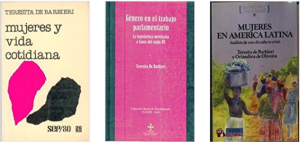Remembering Teresita De Barbieri who passed away on January 21, 2018.
Uruguayan, feminist and academically committed. First exiled in Chile, then in Mexico, she was one of the firsts to contribute to the feminist thought from Latin America, when there was yet to “construct this new object of study in order to legitimize research about women”.
The Marxist theory in which she had graduated in a progressive Chile, from the confluence of a whole generation of thinkers from the Latinamerican and Dependence Theories, was not sufficient to tackle what would come to be known as reproductive work. She joined Fem along with Tununa Mercado invited by Lourdes Arizpe, where they had a significant role in the diffusion of women’s struggle during the Southern Cone dictatorships.
She took part in the Academia and in several organizations, such as CEPAL – which nowadays represents the idea of institutionalization, but not without its internal battles. In the Preparatory Conference in Caracas in 1975, she denounced the persecution against leftists women in Chile. She contested Vilma Espín’s antifeminist speech in Copenhagen (El Feminismo y la Federación de Mujeres Cubanas, Vol. IV, N15, julio-agosto 1980).
She looked for ways of thinking about feminism from a Latin American viewpoint, articulating marxism and feminism. She worked especially with women from popular sectors, rebuilt the everyday life, shone light into invisible work and systematized it. She signaled the “lack of adjustments of Marxist theory readings to the Latin American reality, where it should be clear the feminine condition in underdeveloped and dependent countries, where economies produce ways of non-capitalist production and circulation, where such fragile social security systems alter the labour force value and where women are incorporated into work in a very distinguished way in relation to Europe or the United States.” (FEM Vol. 4, N°17, febrero-marzo 1981).
Today, we should honor and remember this Uruguayan of Latin American Feminist Theory and resume reading her work. Today, when we discuss a system of care, we should not forget we many times we think of it through a key which does not belong to us, to Latin America, to the extended family, a key which cancels the discussion over sexual labor division. Barbieri showed this in the seventies.
May her lost allow us to meet her again.
Download her article Gender and Population Policies: some reflections here.

